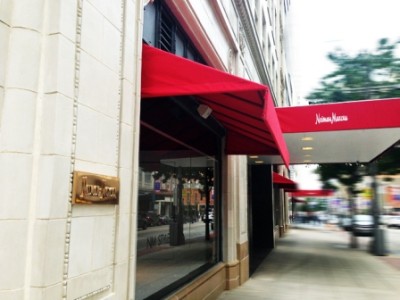
Oscar de la Renta, Christian Louboutin, David Yurman.The list of couture and semi-couture merchandise is limitless, and one store has it all.Walking into Neiman Marcus is like entering an A-list celebrity’s closet.With carefully selected looks that are straight off the runway, this iconic luxury store has served as a dazzling playground for fashionistas of all ages for more than 100 years.
“I’ve been shopping at Neiman Marcus since I was able,” said SMU senior and Neiman Marcus-faithful, Rebecca Marin. Growing up in Texas, Neiman Marcus’ birthplace, her parents would take her once a year to find a special birthday dress. Now that she is older, she continues the tradition with her own hard-earned money.
“When I’m looking for something special or something that I’m willing to invest in, I always head to Neiman Marcus,” she said.
With the flagship store in Dallas—the hub of Texas oil money—shoppers expect nothing less than a sophisticated, high-end shopping experience. However, in just a matter of months, all of this could change.
In September, the owners of Neiman Marcus agreed to sell the luxury retail chain to a privately-owned group led by Ares Management and a Canadian pension plan in a deal worth $6 billion.
“We look forward to partnering with Ares Management and CPPIB,” said Karen Katz, Neiman Marcus Group President and Chief Executive Officer, in a press release on Sept. 9. “We believe the future for Neiman Marcus Group is bright.”
However, while some customers are confident that Neiman Marcus will continue to provide high-end merchandise and quality customer service, others are apprehensive about what the new owners may bring to the table.
Robin Wildmann, a Neiman Marcus customer who checked out the flagship store in Dallas while visiting from Atlanta one day recently, worries that the new Canadian owners might try to commercialize the store too much.
“It’s nice to see the brand still around, it’s nice to see the tradition of it, and it’s nice to see them hold to their values that they’ve had, so hopefully the new ownership can keep that,” Wildmann said.
According to Sales Associate for The Man’s Store at Neiman Marcus, Angelo Rondon-Aponte, he is certain that “everything will stay the same” in light of the change in ownership.
Havy Rosenstock, Department Manager for Designer Jewelry and the Children’s Department, has been with Neiman Marcus for three years. She does not foresee any noticeable transformation in the store either, simply because Neiman Marcus is an “iconic and unique institution” that is not in need of modification.
“There’s so much luxury in the product and in the service that sets us aside from other retailers,” she said. “Neiman Marcus carries lots of unique merchandise that you can’t find other places.”
Founded in Dallas in 1907 by Herbert Marcus, a former buyer with Dallas’ Singer Brothers department store, his sister Carrie Marcus Neiman and her husband Abraham Neiman, Neiman Marcus now has 42 stores nationwide.
Marcus and the Neimans stocked their first store with luxury items that were rare in Dallas at the time, and oil-rich Texans, ever-eager to flaunt their wealth with the latest sophisticated fashions, contributed to the company’s instant success.
Marin believes that beyond the brand image of luxury, it is Neiman Marcus’ “history and class that is ubiquitous throughout generations in their employees, their services, and the overall atmosphere of the store” that serves as the key to its success, and future.
“Neiman Marcus, from the logo to the storefront, paints their brand image of luxury that transcends itself from a typical department store,” said Marin.
High standards of quality and tradition, from customers and Neiman Marcus alike, have developed through the course of the store’s longstanding success. Kelsea West of Assurance Services at Ernst & Young, LLP, and recent SMU alumna, has been a customer since middle school. West always heads to Neiman Marcus whenever she is in need of an impressive addition to her wardrobe.
“When you are making a larger purchase, you want to be very pleased with it so you know your money was well spent and the item is of high quality,” West said. “I always feel this way when I shop at Neiman Marcus.”
Because the sale has allowed the store to remain privately owned, West is not concerned that it will be affected in a negative way. With a public sale, she feared that the store could have expanded for the sake of investment and lost control of attention to detail.
“Neiman Marcus has been around for long enough to be able to remain highly consistent,” West said.
Because the deal is still underway, any changes made to the store would not become evident for a few months. This notion has created some skepticism among shoppers that the store will come out unscathed.
Amy Bowers, a Dallas resident who has been shopping at Neiman Marcus for 20 years, is hopeful that the store will continue to provide the higher-end brands and accommodating services that she cannot find as easily at other stores.
“It would be concerning to me if the store changed, and I hope that they keep things the same because it’s always been such a positive experience shopping there,” Bowers said.
However, there are those who believe that changing ownership could serve as a facelift for the department store to keep up with changing customer demographics.
Marin is one of such advocates, seeing the deal as an opportunity for Neiman Marcus to flourish even more.
“I’m sure the new ownership will only enhance the already strong brand of the retailer by adapting to a new generation of consumers through omni-channel retailing,” she said. “It’s important for a brand to understand what brings the consumers in and what will keep them coming generation after generation.”
Schuyler Mack, SMU Style Editor and a senior at SMU, has shopped at Neiman Marcus for “a very, very long time,” and is also confident that the quality of the store will remain the same.
“I think Neiman Marcus has done so well, and they have such a good blueprint right now, that there’s no need to change the shopping experience,” said Mack. “Time will tell, but I don’t see it changing.”
Avery Stefan is a senior at Southern Methodist University.
She is double majoring in journalism and French. She can be reached at [email protected]









